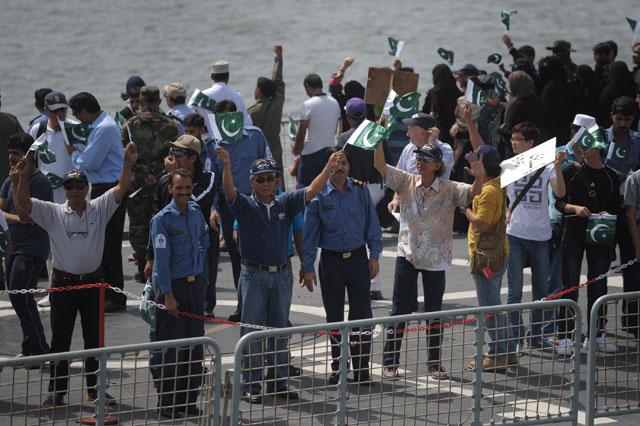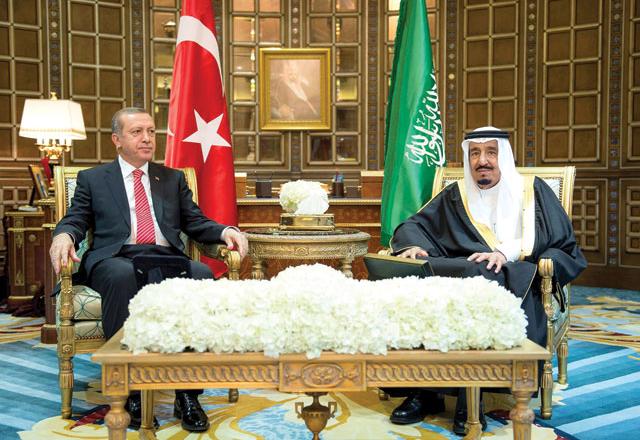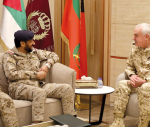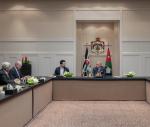You are here
Pakistan PM voices 'deep concern' in Saudi Arabia over Iran tensions
By AFP - Jan 19,2016 - Last updated at Jan 19,2016
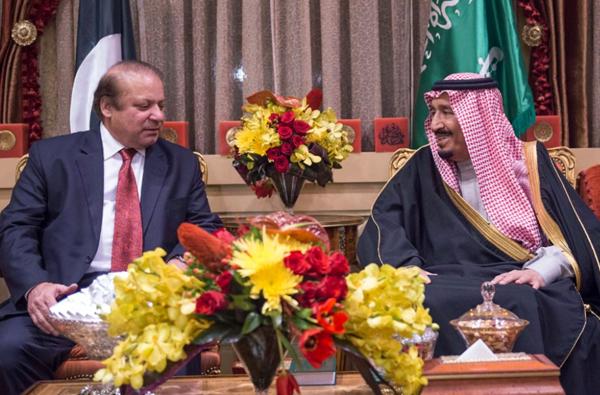
A photo provided by the Saudi Press Agency on Monday shows Saudi King Salman Bin Abdulaziz meeting with Pakistani Prime Minister Nawaz Sharif in the capital Riyadh (AFP photo/SPA/HO )
RIYADH — Pakistan's Prime Minister Nawaz Sharif on Monday expressed "deep concern" to Saudi King Salman over escalating tensions between the Sunni kingdom and predominantly Shiite Iran.
Sharif visited Riyadh in an effort to ease those tensions and is to head on Tuesday to Saudi's rival Iran where he is expected to meet President Hassan Rouhani.
"The prime minister expressed our deep concern on the recent escalation of tensions" between Riyadh and Tehran, Islamabad's foreign ministry spokesman Qazi Khalilullah said.
"He also called for an early resolution of differences through peaceful means, in the larger interest of Ummah [the Islamic nation], particularly during these challenging times."
Saudi Arabia and a number of its Arab allies cut diplomatic ties with Iran in early January, sending already tense relations between the rival nations to a new low.
Riyadh reacted after protesters burned Saudi diplomatic missions in Iran after the kingdom on January 2 executed Shiite cleric Nimr Al Nimr.
He was among 47 people put to death in a single day for "terrorism". Most of those executed were Sunnis.
According to the Saudi Press Agency, King Salman "welcomed the prime minister of Pakistan and his delegation" to his palace.
The report gave no details of their discussions, which SPA earlier said were to touch on regional as well as bilateral issues.
"The purpose of the visit is to mediate and to end the standoff between the two countries," a Pakistani government official told AFP, requesting anonymity, before the prime minister arrived.
Sharif landed in Riyadh two days after a historic international deal lifted sanctions on Iran in return for a scaling back of its nuclear capabilities.
Riyadh fears the agreement will only further embolden Iran, which it accuses of regional interference.
SPA said the prime minister was accompanied by Pakistan's powerful army chief, General Raheel Sharif.
Pakistan is a majority Sunni country but 20 per cent of the population is Shiite.
The country's parliament last year refused to send forces to help a Saudi-led Arab coalition fighting Iran-backed Shiite Houthi rebels in Yemen.
But during Monday's meeting, Pakistan "assured the kingdom of its support" for a separate Saudi coalition of 34 nations to combat terrorism in the Islamic world, the Pakistani statement said.
"It was agreed that both countries would work together to defeat our common enemy — terrorism and extremism."
Diplomats have said it remained unclear how the 34-nation coalition will work in practice.
Pakistan has deep military connections with Saudi Arabia and it has long benefited from the oil-rich kingdom's largesse.
Sharif himself has close personal ties with the Saudi royal family who sheltered him during years in exile.
Related Articles
TEHRAN, Iran — The execution of a Shiite cleric in Sunni-ruled Saudi Arabia has laid bare the divisions now gripping the Middle East, as pro
Pakistan is "not in a hurry" to decide whether to join the Saudi-led coalition against rebels in Yemen, the prime minister said Tuesday, before a round of shuttle diplomacy involving Iran and Turkey.
Turkish President Recep Tayyip Erdogan arrived Monday in Riyadh for a visit at the king's invitation in what is seen as a Saudi bid to unify Sunnis against Iran and jihadists.


